List of margraves and electors of Brandenburg
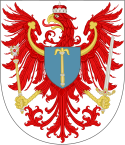
This article lists the Margraves and Electors of Brandenburg during the period of time that Brandenburg was a constituent state of the Holy Roman Empire.
The Mark, or March, of Brandenburg was one of the primary constituent states of the Holy Roman Empire. It was created in 1157 as the Margraviate of Brandenburg by Albert the Bear, Margrave of the Northern March. In 1356, by the terms of the Golden Bull of Charles IV, the Margrave of Brandenburg was given the permanent right to participate in the election of the Holy Roman Emperor with the title of Elector (German: Kurfürst).
The early rulers came from several different dynasties, but from 1415 Brandenburg and its successor states were ruled by the House of Hohenzollern for over 500 years. From 1618 onward, Brandenburg was ruled in personal union with the Duchy of Prussia. The Hohenzollerns raised Prussia to a kingdom as the Kingdom of Prussia in 1701, and from then on Brandenburg was de facto treated as part of the kingdom even though it was legally still part of the Holy Roman Empire. The titles of Margrave of Brandenburg and Elector of Brandenburg were abolished along with the Holy Roman Empire in 1806, and Brandenburg was formally integrated into Prussia. Despite this, the Prussian kings still included the title "Margrave of Brandenburg" in their royal style. From 1871 to 1918 the Hohenzollerns were also German Emperors.
Margraves and Electors of Brandenburg
| Ascanian Dynasty | |||||
|---|---|---|---|---|---|
| Name | Reign | Comments | |||
| Albert I the Bear | 1157–1170 | Ruler of the Nordmark from 1134. Called "Albert the Bear". | |||
| Otto I | 1170–1184 | Son of Albert I. Ruled together with his father from 1144. | |||
| Otto II the Generous | 1184–1205 | Son of preceding. | |||
| Albert II | 1205–1220 | Brother. | |||
|
Co-rulers, sons of Albert II. | ||||
| From 1266 to 1319, Brandenburg was held by the two lines of Brandenburg-Stendal and Brandenburg-Salzwedel, all of whom jointly shared the title of Margrave. | |||||
| Brandenburg-Stendal | Brandenburg-Salzwedel | ||||
Co-rulers, sons of John I:
|
Co-rulers, sons of Otto III:
| ||||
| Reunited Brandenburg | |||||
| 1317-1318: Henry I Lackland, Valdemar I the Great 1318-1319: Valdemar I the Great 1319-1320: Henry II the Child | |||||
| After the extinction of the Ascanian dynasty in 1320, Brandenburg came under the control of the Emperor Louis IV of the House of Wittelsbach, who granted Brandenburg to his eldest son, Louis V of Bavaria. | |||||
House of Wittelsbach
| Ruler | Born | Reign | Death | Ruling part | Consort | Notes | |
|---|---|---|---|---|---|---|---|
| Louis I the Brandenburger |  |
May 1315 | 1323-1351 | 18 September 1361 | Margraviate of Brandenburg | Margaret of Denmark 1324 no children Margaret, Countess of Tyrol 10 February 1342 Meran four children |
In 1351 his brothers Louis and Otto gave up their inheritance in Bavaria, in excnhange of the Electoral dignity in Brandenburg. |
| Louis II the Roman |  |
7 May 1328 | 1351-1356 | 17 May 1365 | Margraviate of Brandenburg | Cunigunde of Poland before 1349 no children Ingeborg of Mecklenburg-Schwerin 1360 no children |
Elevated in 1356 by the as First Elector of Brandenburg. |
| Louis II the Roman |  |
7 May 1328 | 1356-1365 | 17 May 1365 | Electorate of Brandenburg | Cunigunde of Poland before 1349 no children Ingeborg of Mecklenburg-Schwerin 1360 no children |
Elevated in 1356 by the as First Elector of Brandenburg |
| Otto VII the Lazy |  |
1340/42 | 1365-1373 | 15 November 1379 | Electorate of Brandenburg | Catherine of Bohemia 19 March 1366 no children |
Co-ruler of Brandenburg with his brother from 1351, but as a minor (b. 1346) took no part in administration until his brother's death. Abdicated 1373 but retained Electoral title. Died 1379. |
Luxemburg Dynasty
| Image | Name | Began | Ended | Comments |
|---|---|---|---|---|

|
Wenceslaus Wenzel |
2 October 1373 | 29 November 1378 | Emperor Charles IV forced the last Wittelsbach Elector to abdicate, and then installed his own son, Wenceslaus. As Wenceslaus was still a minor (b. 1361), the Emperor administered the margraviate for him. |

|
Sigismund | 29 November 1378 | 1388 | Younger brother of Wenceslaus; took control of Brandenburg on his brother's ascension as King of Germany and Bohemia. Gave up Brandenburg to his cousin Jobst as security for a substantial loan. |

|
Jobst | 1388 | 16 January 1411 | Sigismund's first cousin, nephew of Charles IV. Elected as German King in 1410 in opposition to Sigismund, but died very shortly afterwards. |

|
Sigismund | 16 January 1411 | 30 April 1415 | Following Jobst's death, Sigismund regained control of Brandenburg and was elected undisputed King of Germany. |
House of Hohenzollern
Partitions of Brandenburg under Hohenzollern rule
| Electorate of Brandenburg (1415-1440) |
Margraviate of Brandenburg (under Luxemburg rule) | |||
| Margraviate of Brandenburg (1426-1440) | ||||
| Electorate of Brandenburg and Margraviate of Brandenburg-Brandenburg (1440-1618) |
Margraviate of Brandenburg-Ansbach (1440-1791) |
Margraviate of Brandenburg-Kulmbach (1st creation) (1440-1457) | ||
| Margraviate of Brandenburg-Kulmbach (2nd creation) (1486-1495) | ||||
| Margraviate of Brandenburg-Kulmbach (3rd creation) (1515-1535) | ||||
| Margraviate of Brandenburg-Küstrin (1535-1571) | ||||
| Margraviate of Brandenburg-Bayreuth (changed seat from Kulmbach to Bayreuth) (1603-1769) | ||||
| Electorate of Brandenburg, Duchy of Prussia and Margraviate of Brandenburg-Brandenburg (1618-1701) | ||||
| Margraviate of Brandenburg-Schwedt (1692-1788) | ||||
| Electorate of Brandenburg and Kingdom of Prussia (1701-1806) | ||||
| Kingdom of Prussia (1806-1918) | ||||
Table of rulers
(Note: Here the numbering of the princes is the same for all principalities, as all were titled Margraves of Brandenburg, despite of the different parts of land and its particular numbering of the rulers. The princes are numbered by the year of their succession.)
| Ruler | Born | Reign | Death | Ruling part | Consort | Notes | |
|---|---|---|---|---|---|---|---|
| Frederick I Friedrich I |

|
21 September 1371 | 30 April 1415 - 20 September 1440 | 20 September 1440 | Electorate of Brandenburg | Elisabeth of Bavaria-Landshut 18 September 1401 ten children |
Originally Burgrave of Nuremberg as Frederick VI. Appointed by King Sigismund in 1415 and enfeoffed in 1417. |
| 1417-1426 | Margraviate of Brandenburg | In spite of being granted with the Electorate in 1415, the Margraviate was only given to him in 1417, which he abdicate to his son in 1426. In 1420 joined all his ancestors' Nurembergian lands with Brandenburg. | |||||
| John VI the Alchemist | 
|
1406 | 1426-1440 | 16 November 1464 | Margraviate of Brandenburg | Barbara of Saxe-Wittenberg 1416 four children |
Received the Margraviate of Brandenburg from his father. However, after the latter's death, Brandenburg was redivided, and from then on retained Kulmbach. Abdicated 1457. |
| 1440-1457 | Margraviate of Brandenburg-Kulmbach | ||||||
| Frederick II Irontooth Friedrich II |
 |
19 November 1413 | 20 September 1440 - 10 February 1471 | 10 February 1471 | Margraviate of Brandenburg and Electorate of Brandenburg | Catherine of Saxony 11 June 1441 Wittenberg three children |
Reunited definitely the Margraviate and the Electorate of Brandenburg; however, his father gave to his brothers the lands of Ansbach and Kulmbach. |
| Albert IV Achilles Albrecht Achilles |

|
9 November 1414 | 1440-1457 | 11 March 1486 | Margraviate of Brandenburg-Ansbach | Margaret of Baden 1446 four children Anna of Saxony 12 November 1458 Ansbach thirteen children |
Received Ansbach after his father's death. In 1457 inherited Kulmbach from his brother John. On the death of his brother Frederick in 1471, became Elector. |
| 1457-1486 | Margraviate of Brandenburg-Ansbach and Margraviate of Brandenburg-Kulmbach | ||||||
| 10 February 1471 - 11 March 1486 | Electorate of Brandenburg | ||||||
| John VII Cicero Johann Cicero |
 |
2 August 1455 | 11 March 1486 - 9 January 1499 | 9 January 1499 | Electorate of Brandenburg | Margaret of Thuringia 15 August 1476 Berlin six children |
Eldest son of Albert Achilles. |
| Sigismund | 27 September 1468 | 1486-1495 | 26 February 1495 | Margraviate of Brandenburg-Kulmbach | Unmarried | Received Kulmbach after his father's death. Left no descendants, and Kulmbach returned to Ansbach. | |
| Frederick III the Elder | 
|
8 May 1460 | 1486-1495 | 4 April 1536 | Margraviate of Brandenburg-Ansbach | Sophia of Poland 14 February 1479 Frankfurt (Oder) seventeen children |
Received Ansbach after his father's death. In 1495 inherited the land of his brother. In 1515 the lands were separated again. |
| 1495-1515 | Margraviate of Brandenburg-Ansbach and Margraviate of Brandenburg-Kulmbach | ||||||
| 1515-1536 | Margraviate of Brandenburg-Ansbach | ||||||
| Joachim I Nestor |  |
21 February 1484 | 9 January 1499 - 11 July 1535 | 11 July 1535 | Electorate of Brandenburg | Elizabeth of Denmark 10 April 1502 Berlin five children |
|
| Casimir I |  |
27 December 1481 | 1515-1527 | 21 September 1527 | Margraviate of Brandenburg-Kulmbach | Susanna of Bavaria 25 August 1518 Augsburg five children |
Eldest son of Frederick III, received Kulmbach in his father's lifetime. |
| George of Brandenburg-Ansbach (regent) |  |
4 March 1484 | 1527-1541 | 27 December 1543 | Margraviate of Brandenburg-Kulmbach | Beatrice de Frangepan 21 January 1509 Gyula no children Hedwig of Münsterberg-Oels 9 January 1525 Oleśnica two children Emilie of Saxony 25 August 1533 four children |
Heir of Frederick III and brother of Casimir, became regent on behalf of his nephew, in 1527. |
| Albert V Alcibiades the Warlike |  |
28 March 1522 | 1541-1557 | 8 January 1557 | Margraviate of Brandenburg-Kulmbach | Unmarried | Left no descendants, and Kulmbach returned to Ansbach. |
| Joachim II Hector |  |
13 January 1505 | 11 July 1535 - 3 January 1571 | 3 January 1571 | Electorate of Brandenburg | Magdalena of Saxony 6 November 1524 Dresden six children Hedwig of Poland 29 August/1 September 1535 Kraków six children |
First Protestant Elector of Brandenburg. |
| John VIII |  |
3 August 1513 | 1535-1571 | 13 January 1571 | Margraviate of Brandenburg-Küstrin | Catherine of Brunswick-Wolfenbüttel 11 November 1537 Wolfenbüttel two children |
Son of Elector Joachim I. The Margraviate of Küstrin was created for him. After his death without male descendants, Küstrin was annexed again to the Electorate. |
| George I the Pious |  |
4 March 1484 | 1536-1543 | 27 December 1543 | Margraviate of Brandenburg-Ansbach | Beatrice de Frangepan 21 January 1509 Gyula no children Hedwig of Münsterberg-Oels 9 January 1525 Oleśnica two children Emilie of Saxony 25 August 1533 four children |
|
| Joachim II Hector, Elector of Brandenburg (regent) |  |
13 January 1505 | 1543-c.1548 | 3 January 1571 | Margraviate of Brandenburg-Ansbach | Magdalena of Saxony 6 November 1524 Dresden six children Hedwig of Poland 29 August/1 September 1535 Kraków six children |
Regents on behalf of George I's son. |
| John Frederick I, Elector of Saxony (regent) |  |
30 June 1503 | 1543-1547 | 3 March 1554 | Margraviate of Brandenburg-Ansbach | Sibylle of Cleves 9 February 1527 Torgau four children | |
| Maurice, Elector of Saxony (regent) |  |
13 January 1505 | 1547-c.1548 | 3 January 1571 | Margraviate of Brandenburg-Ansbach | Agnes of Hesse 9 January 1541 Marburg two children | |
| Philip I, Landgrave of Hesse (regent) |  |
13 November 1504 | 1543-c.1548 | 31 March 1567 | Margraviate of Brandenburg-Ansbach | Christine of Saxony 11 December 1523 Kassel ten children Margarethe von der Saale 14 March 1540 Rotenburg (bigamous and morganatic) nine children | |
| George Frederick I the Elder | 
|
5 April 1539 | c.1548-1557 | 25 April 1603 | Margraviate of Brandenburg-Ansbach | Elisabeth of Brandenburg-Küstrin 26 December 1558 Küstrin no children Sophie of Brunswick-Lüneburg 3 May 1579 Dresden tno children |
In 1557 reunited Kulmbach to Ansbach once more. Left no descendants, and the Margraviates passed to sons of the Elector John George. |
| 1557-1603 | Margraviate of Brandenburg-Ansbach and Margraviate of Brandenburg-Kulmbach | ||||||
| John George Johann Georg |
 |
11 September 1525 | 3 January 1571 - 8 January 1598 | 8 January 1598 | Electorate of Brandenburg | Sophie of Legnica 15 February 1545 one child Sabina of Brandenburg-Ansbach 12 February 1548 Ansbach eleven children Elisabeth of Anhalt-Zerbst 6 October 1577 Letzlingen eleven children |
|
| Joachim Frederick Joachim Friedrich |
 |
27 January 1546 | 8 January 1598 - 18 July 1608 | 18 July 1608 | Electorate of Brandenburg | Catherine of Brandenburg-Küstrin 8 January 1570 Küstrin eleven children Eleanor of Prussia 2 November 1603 Berlin one child |
|
| Joachim Ernest |  |
22 June 1583 | 1603-1625 | 7 March 1625 | Margraviate of Brandenburg-Ansbach | Sophie of Solms-Laubach 1612 Ansbach three children |
Son of Elector John George. Received Ansbach |
| Christian |  |
30 January 1581 | 1603-1655 | 30 May 1655 | Margraviate of Brandenburg-Bayreuth | Maria of Prussia 29 April 1604 Kulmbach nine children |
Son of Elector John George. Received Kulmbach. In 1604 moved the capital of the Margraviate to Bayreuth. From 1604 on, Brandenburg-Kulmbach changed its name to Brandenburg-Bayreuth. |
| John Sigismund Johann Sigismund |
 |
8 November 1572 | 18 July 1608 - 3 November 1619 | 23 December 1619 | Electorate of Brandenburg | Anna of Prussia 30 October 1594 Königsberg eight children |
Duke of Prussia from 1618. |
| George William I Georg Wilhelm |
 |
13 November 1595 | 3 November 1619 - 1 December 1640 | 1 December 1640 | Electorate of Brandenburg | Elizabeth Charlotte of the Palatinate 24 July 1616 Heidelberg four children |
His reign was marked by ineffective governance during the Thirty Years' War. Also Duke of Prussia. |
| Frederick IV | 1 May 1616 | 1625-1634 | 6 September 1634 | Margraviate of Brandenburg-Ansbach | Unmarried | Left no descendants. He was succeeded by his brother. | |
| Albert VI |  |
18 September 1620 | 1634-1667 | 22 October 1667 | Margraviate of Brandenburg-Ansbach | Henriette Louise of Württemberg-Mömpelgard 31 August 1642 Stuttgart three children Sophie Margarete of Oettingen-Oettingen 15 October 1651 Oettingen five children Christine of Baden-Durlach 6 August 1665 Durlach no children |
|
| Frederick William I the Great Elector Friedrich Wilhelm |
 |
16 February 1620 | 1 December 1640 - 29 April 1688 | 29 April 1688 | Electorate of Brandenburg | Louise Henriette of Nassau 7 December 1646 The Hague six children Sophia Dorothea of Schleswig-Holstein-Sonderburg-Glücksburg 13 July 1668 Gröningen seven children |
Also Duke of Prussia. |
| Christian Ernest |  |
6 August 1644 | 1655-1712 | 20 May 1712 | Margraviate of Brandenburg-Bayreuth | Erdmuthe Sophie of Saxony 29 October 1662 Dresden no children Sofie Louise of Württemberg 8 February 1671 Stuttgart six children Elisabeth Sophie of Brandenburg 30 March 1703 Potsdam nine children |
Son of Erdmann August, son of Christian I. |
| John Frederick |  |
18 October 1654 | 1667-1686 | 22 March 1686 | Margraviate of Brandenburg-Ansbach | Johanna Elisabeth of Baden-Durlach 26 January 1673 Durlach five children Eleonore Erdmuthe of Saxe-Eisenach 4 November 1681 Eisenach three children |
|
| Appointed regency (1686-1692) | |||||||
| Christian Albert | 18 September 1675 | 1686-1692 | 16 October 1692) | Margraviate of Brandenburg-Ansbach | Unmarried | Died as a minor; he was succeeded by his brother. | |
| Frederick V Friedrich I |
 |
11 July 1657 | 29 April 1688 - 25 February 1713 | 25 February 1713 | Electorate of Brandenburg | Elisabeth Henriette of Hesse-Kassel 13 August 1679 Potsdam one child Sophia Charlotte of Hanover 8 October 1684 Herrenhausen two children Sophia Louise of Mecklenburg-Schwerin 28 November 1708 Berlin no children |
Also Duke of Prussia. In 1701 became the first King in Prussia, as Frederick I. |
| George Frederick II |  |
3 May 1678 | 1692-1703 | 29 March 1703 | Margraviate of Brandenburg-Ansbach | Unmarried | Died without descendants; he was succeeded by his brother. |
| Philip William |  |
19 May 1669 | 1692-1711 | 19 December 1711 | Margraviate of Brandenburg-Schwedt | Johanna Charlotte of Anhalt-Dessau 25 January 1699 Oranienbaum six children |
Son of Elector Frederick William I. The Margraviate of Schwedt was created for him. |
| William Frederick |  |
8 January 1686 | 1703-1723 | 7 January 1723 | Margraviate of Brandenburg-Ansbach | Christiane Charlotte of Württemberg-Winnental 28 August 1709 Stuttgart three children |
|
| Frederick William II |  |
17 November 1700 | 1711-1771 | 4 March 1771 | Margraviate of Brandenburg-Schwedt | Sophia Dorothea of Prussia 10 November 1734 Potsdam five children |
Left no male descendants. The title passed to his brother, Frederick Henry. |
| George William II |  |
26 November 1678 | 1712-1726 | 18 December 1726 | Margraviate of Brandenburg-Bayreuth | Sophie of Saxe-Weissenfels 16 October 1699 Leipzig five children |
|
| Frederick William III the Soldier-King Friedrich Wilhelm I |
 |
14 August 1688 | 25 February 1713 - 31 May 1740 | 31 May 1740 | Electorate of Brandenburg | Sophia Dorothea of Hanover 28 November 1706 Berlin fourteen children |
Also King of Prussia as Frederick William I. |
| Christiane Charlotte of Württemberg-Winnental (regent) |  |
20 August 1694 | 1723-1729 | 25 December 1729 | Margraviate of Brandenburg-Ansbach | William Frederick 28 August 1709 Stuttgart three children |
|
| Charles William Frederick the Wild Margrave |  |
12 May 1712 | 1729-1757 | 3 August 1757 | Margraviate of Brandenburg-Ansbach | Friederike Luise of Prussia 30 May 1729 Berlin two children |
|
| George Frederick Charles |  |
30 June 1688 | 1726-1735 | 17 May 1735 | Margraviate of Brandenburg-Bayreuth | Princess Dorothea of Schleswig-Holstein-Sonderburg-Beck 17 April 1709 Reinfeld five children |
|
| Frederick VI |  |
10 May 1711 | 1735-1763 | 26 February 1763 | Margraviate of Brandenburg-Bayreuth | Wilhelmine of Prussia 17 April 1709 Berlin one child Sophie Caroline of Brunswick-Wolfenbüttel 20 September 1759 Brunswick no children |
Left no male descendants; the title passe to Frederick Christian, from a collateral Bayreuth line. |
| Frederick VII the Great Friedrich II |
 |
24 January 1712 | 31 May 1740 - 17 August 1786 | 17 August 1786 | Electorate of Brandenburg | Elisabeth Christine of Brunswick-Wolfenbüttel-Bevern 12 June 1733 Wolfenbüttel no children |
Also King of Prussia as Frederick II. King in Prussia to 1772; after annexations of Polish Prussian territory, "King of Prussia". Left no descendants. The title passed to his nephew, Frederick William II of Prussia. |
| Charles Alexander |  |
24 February 1736 | 1757-1769 | 5 January 1806 | Margraviate of Brandenburg-Ansbach | Frederica Caroline of Saxe-Coburg-Saalfeld 22 November 1754 Coburg no children Elizabeth Craven 13/30 October 1791 Lisbon morganatic no children |
In 1769 reunited both Margraviates of Ansbach and Bayreuth. |
| Frederick Christian |  |
17 July 1708 | 1763-1769 | 20 January 1769 | Margraviate of Brandenburg-Bayreuth | Victoria Charlotte of Anhalt-Zeitz-Hoym 26 April 1732 Schaumburg two children |
Great-grandson of Christian I and cousin of his predecessors. Left no male descendants; Bayreuth was reunited to Ansbach. |
| Charles Alexander |  |
24 February 1736 | 1769-1791 | 5 January 1806 | Margraviate of Brandenburg-Ansbach and Margraviate of Brandenburg-Bayreuth | Frederica Caroline of Saxe-Coburg-Saalfeld 22 November 1754 Coburg no children Elizabeth Craven 13/30 October 1791 Lisbon morganatic no children |
In 1791 sold both Margraviates to the Kingdom of Prussia. |
| Frederick Henry |  |
21 August 1709 | 1771-1788 | 12 December 1788 | Margraviate of Brandenburg-Schwedt | Leopoldine Marie of Anhalt-Dessau 13 February 1739 two children |
Left no male descendants. Schwedt went back to the Electorate. |
| Frederick William IV Friedrich Wilhelm II |
 |
25 September 1744 | 17 August 1786 - 16 November 1797 | 16 November 1797 | Electorate of Brandenburg | Elisabeth Christine of Brunswick-Wolfenbüttel 14 July 1765 Salzdahlum (annulled 18 April 1769) one child Frederika Louisa of Hesse-Darmstadt 14 July 1769 Berlin eight children Julie von Voss 7 April 1787 Berlin (morganatic and bigamous) no children Sophie von Dönhoff 11 April 1790 Berlin (morganatic and bigamous) two children |
Nephew of Frederick the Great, as son of Augustus William, his brother. Also King of Prussia as Frederick William II. |
| Frederick William V Friedrich Wilhelm III |
 |
3 August 1770 | 16 November 1797 - 6 August 1806 | 7 June 1840 | Electorate of Brandenburg | Louise of Mecklenburg-Strelitz 24 December 1793 Berlin ten children Auguste von Harrach 9 November 1824 Berlin (morganatic) no children |
King of Prussia (as Frederick William III) and last Elector of Brandenburg. The Holy Roman Empire was dissolved in 1806, after which Frederick William ruled as independent King of Prussia (including Brandenburg) to his death in 1840. |
Titular Margraves of Brandenburg after 1806
This includes Kings of Prussia with the title of Margrave of Brandenburg (1806–1918) and pretenders to the throne of Prussia (1918–present)
| Margrave | Portrait | Lifespan | Reign start | Reign end |
|---|---|---|---|---|
| Frederick William III Friedrich Wilhelm III |

|
3 August 1770 – 7 June 1840 | 6 August 1806 | 7 June 1840 |
| Frederick William IV Friedrich Wilhelm IV |

|
15 October 1795 – 2 January 1861 | 7 June 1840 | 2 January 1861 |
| William I Wilhelm I |
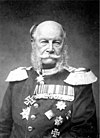
|
22 March 1797 – 9 March 1888 | 2 January 1861 | 9 March 1888 |
| Frederick III Friedrich III |

|
18 October 1831 – 15 June 1888 | 9 March 1888 | 15 June 1888 |
| William II Wilhelm II |
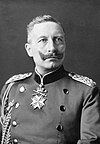
|
27 January 1859 – 4 June 1941 | 15 June 1888 | Prussian monarchy abolished on 28 November 1918 4 June 1941 |
| William III Wilhelm III |
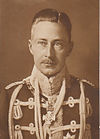
|
6 May 1882 – 20 July 1951 | 4 June 1941 | 20 July 1951 |
| Louis Ferdinand I Ludwig Ferdinand I |
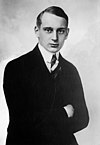
|
9 November 1907 – 26 September 1994 | 20 July 1951 | 26 September 1994 |
| George Frederick I Georg Friedrich I |

|
10 June 1976 – present | 26 September 1994 | Incumbent |
Upper Presidents of Brandenburg
In 1815 Brandenburg was constituted as the Prussian Province of Brandenburg without a sovereign ruler, but with Upper Presidents appointed by the central Prussian government. The upper president carried out central prerogatives on the provincial level and supervised the implementation of central policy on the lower levels of administration.
- 1815–1824: Georg Friedrich Christian von Heydebreck (1765–1828)
- 1825–1840: Friedrich Magnus von Bassewitz (1773–1858)
- 1840–1842: vacancy
- 1842–1848: August Werner von Meding (1792–1871)
- 1848–1849: Robert von Patow (1804–1890), per pro
- 1849–1850: vacancy
- 1849–1850: August Hermann Klemens Freiherr Wolff von Metternich (1803–1872), per pro
- 1850–1858: Eduard Heinrich von Flottwell (1786–1865)
- 1859–1862: Eduard Heinrich von Flottwell (1786–1865)
- 1862: Werner Ludolph Erdmann von Selchow (1806–1884)
- 1862–1879: Gustav Wilhelm von Jagow (1813–1879)
- 1879–1899: Heinrich von Achenbach (1829–1899)
- 1899–1905: Theobald von Bethmann-Hollweg (1856–1921)
- 1905–1909: August von Trott zu Solz (1855–1938)
- 1909–1910: Friedrich Wilhelm von Loebell (1855–1931)
- 1910–1914: Alfred von Conrad (1852–1914)
- 1914–1917: Rudolf von der Schulenburg (1860–1930)
- 1917–1919: Friedrich Wilhelm von Loebell (1855–1931)
- 1919–1933: Adolf Maier (1871–1963)
- 1933–1936: Wilhelm Kube (1887–1943)
- 1937–1945: Emil Stürtz (1892–1945), since 1936 per pro
Land Directors of Brandenburg
Since 1875, with the strengthening of self-rule within the provinces, the urban and rural counties elected representatives for the provincial diets (Provinziallandtage). These parliaments legislated within the competences transferred to the provinces. The provincial diet of Brandenburg elected a provincial executive body (government), the provincial committee (Provinzialausschuss), and a head of province, the land director (Landesdirektor).[1] Self-rule was abolished under the Nazi dictatorship.
- 1876–1896: Albert Erdmann Karl Gerhard von Levetzow (1827–1903), German Conservative Party
- 1896–1912: Otto Karl Gottlob von Manteuffel (1844–1913), German Conservative Party
- 1912–1930: Joachim von Winterfeldt-Menkin (1865–1945)
- 1930–1933: Hugo Swart (1885–1952)
Post-monarchy
| History of Brandenburg and Prussia |
|---|
  |
|
| Present |
|
After the defeat of Nazi Germany in the Second World War, Brandenburg, which had previously been merely a province of Prussia, re-emerged as a German Land.
Prime Minister of Brandenburg, 1945–1952
- Karl Steinhoff (SPD/SED), 1945–1949.
- Rudolf Jahn (SED), 1949–1952.
After being abolished in a reorganization of the territories administered by the German Democratic Republic (East Germany), the Land Brandenburg was restored in the prelude to German unification in 1990.
Ministers President of Brandenburg, 1990 to date
- Manfred Stolpe (SPD), 1990–2002.
- Matthias Platzeck (SPD), 2002–2013
- Dietmar Woidke (SPD), since 2013.
Notes
- ^ In other Prussian provinces the same office used to be called Landeshauptmann (about in English: land captain). Cf. article: "Landesdirektor", in: Der Große Brockhaus: Handbuch des Wissens in zwanzig Bänden: 21 vols.; Leipzig: Brockhaus, 151928–1935; Bd. 11 (1932), p. 71.
